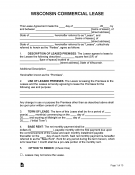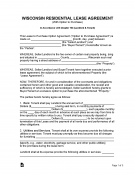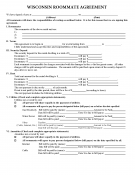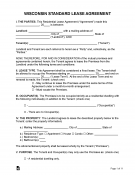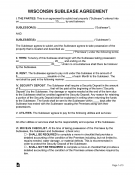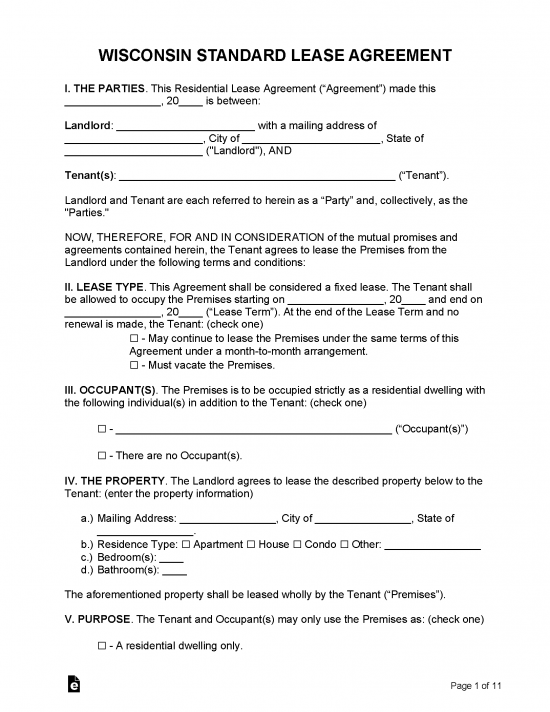Wisconsin lease agreements set the terms for tenancies in the state. The agreements must be in writing and signed both parties. Typical terms include the monthly rent, the utilities that each party is responsible for, and whether smoking is allowed on the property. Lease agreements can help the parties avoid disputes by clarifying their respective obligations under the lease.
Contents
- Wisconsin Lease Agreements: By Type (6)
- Landlord-Tenant Laws
- Handbooks and Guides
By Type (6)
- Commercial Lease Agreement
- Month-to-Month Lease Agreement
- Rent-to-Own Lease Agreement
- Roommate Lease Agreement
- Standard Lease Agreement
- Sublease Agreement
Download: Adobe PDF, MS Word, Rich Text Format
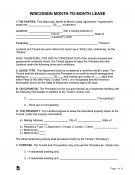 Month-to-Month Lease Agreement
Month-to-Month Lease Agreement
Download: Adobe PDF, MS Word, Rich Text Format
Download: Adobe PDF, MS Word, Rich Text Format
Download: Adobe PDF, MS Word, Rich Text Format
Download: Adobe PDF, MS Word, Rich Text Format
Download: Adobe PDF, MS Word, Rich Text Format
Landlord-Tenant Laws
Statutes – Wisconsin Statutes, Chapter 704 (Landlord and Tenant), Wisconsin Administrative Code, Chapter ATCP 134 (Residential Rental Practices)
Required Disclosures (4)
Agent/Landlord Identification – The landlord must inform the tenant in writing of the names and contact information for the property manager, or a person permitted to come on to the property to make repairs, and the property’s owner or an agent permitted to receive legal notices and requests on the owner’s behalf. (§ 134.04)
Lead-Based Paint – Under federal law, landlords leasing properties with dwelling units built before 1978 must inform tenants of the danger of lead-based paints.
Move-in Checklist – If a landlord requires a security deposit, the landlord must notify the tenant, in writing and within seven (7) days of the start of the tenancy, that the tenant is permitted to inspect the property and inform the landlord of problems. The landlord must also offer the tenant the additional or alternative option of receiving from the landlord a written list of any items that resulted in a deduction from the previous tenant’s security deposit; the landlord must provide this information within thirty (30) days of the current tenant’s request, or within seven (7) days of providing an itemization of the deductions to the previous tenant, whichever comes first. (§ 134.06)
Water/Heat/Electricity – If the cost of water, heat or electricity is not included in the monthly rent, this information must be explicitly stated in the lease agreement. (§ 134.04(3))
Security Deposit Laws
Maximum Amount ($)
Under state law, there is no maximum to the amount a landlord may demand as a security deposit. However, the city or county in which the property is located may set a maximum of its own.
Returning to Tenant
The landlord must return security deposits to tenants within twenty-one (21) days of either the scheduled date of the termination of the rental agreement, the date on which the subsequent tenancy begins if the tenant is evicted or holds over, or the date on which the tenant is believed to have left the property in cases of abandonment.
Landlords may retain a portion of the security deposit only to: (i) account for unpaid rent; (ii) settle unpaid fees or bills that the lease agreement made the tenant’s responsibility; or (iii) pay for cleaning or repair of damages to the unit, other than those resulting from normal wear-and-tear. A landlord may include additional, nonstandard reasons for withholding a deposit in the lease agreement, but to be enforceable, the tenant must have signed or written his or her initials next to each reason. (§ 704.28)
When is Rent Due? (grace period)
Wisconsin regulations and statutes are silent on a rent due date and grace period, meaning that rent is due on the date identified in the lease agreement.
Eviction Notice (non-payment)
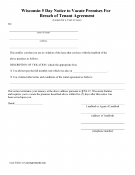 5-Day Notice to Pay or Quit – If a tenant fails to pay rent on the date it is due, the landlord may provide this notice to the tenant, stating that the landlord has the right to terminate the tenancy if all owed monies is not paid within five (5) days. Alternatively, the landlord may provide the tenant with a fourteen-day notice to quit that does not give the tenant the opportunity to remain by paying the owed rent. The latter option is not available for tenants on leases of a term longer than month-to-month. (§ 704.17)
5-Day Notice to Pay or Quit – If a tenant fails to pay rent on the date it is due, the landlord may provide this notice to the tenant, stating that the landlord has the right to terminate the tenancy if all owed monies is not paid within five (5) days. Alternatively, the landlord may provide the tenant with a fourteen-day notice to quit that does not give the tenant the opportunity to remain by paying the owed rent. The latter option is not available for tenants on leases of a term longer than month-to-month. (§ 704.17)
Download: Adobe PDF
Maximum Fees ($)
Late Rent Penalties
Landlords are permitted to charge late fees only if the fee is included in lease agreement. Landlords may not charge penalties for failing to pay a late fee. (ATCP § 1304.09)
NSF Checks
Wisconsin statutes and regulations do not govern the amount that landlords may charge a tenant for bouncing a rent check. Best practice is to name the fee in the lease agreement, and for the fee to be reasonable.
Tenant’s Unclaimed Property
If a tenant is evicted and leaves behind personal property, the landlord may dispose of the property as the landlord chooses; should the landlord choose to sell the property, the landlord may use the proceeds to settle any outstanding debts, and send the remainder to the state. In other cases, landlords and tenants may negotiate whether or not storage is required, and may include such a term in the lease agreement if it is clearly identified.
An exception applies to medical items, which the landlord, regardless of what is stated in the lease agreement, must store for at least seven (7) days and return promptly to the tenant if requested. (§ 704.05)
